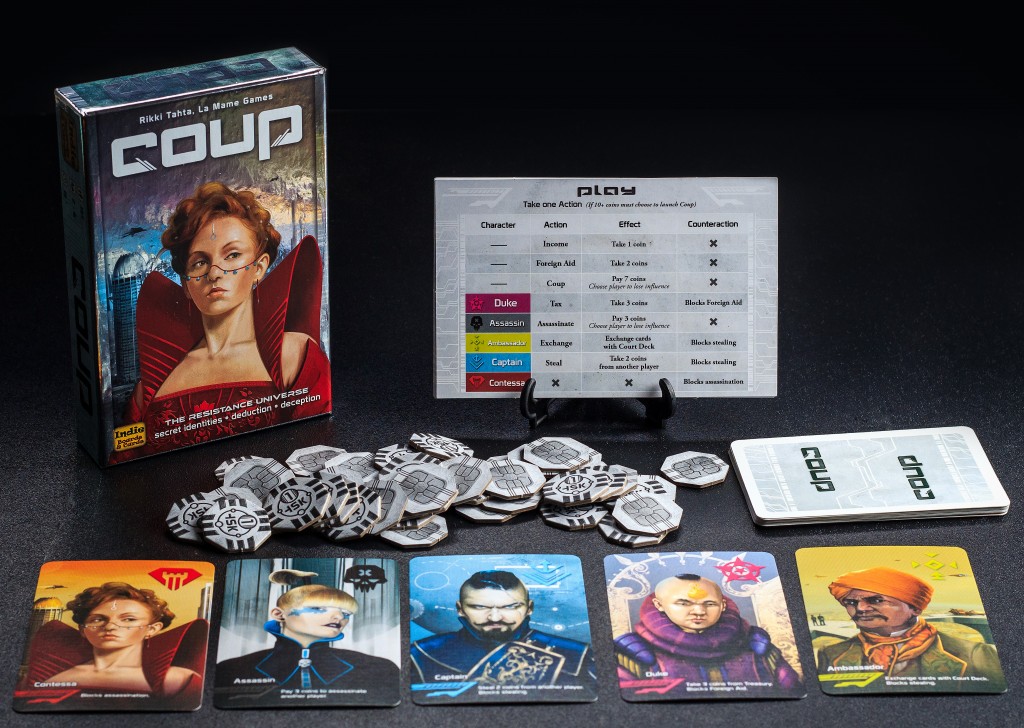Coup is a social deduction game where the players take on the role of government officials in a distant future where the wealthy few have seized the government and seek to centralize their own power. At the start of the game, each player is dealt two cards face-down, which serve as both their “Influence” or lives and the abilities they can use safely. The goal of the game is to lie and cheat your way into more money so that you can “coup” or destroy the influence of your opponents until you are the last government official standing.
One of Coup’s central game mechanics is being able to successfully lie to your opponents. While the player knows the roles they’re given, no one else knows for sure. As long as you do it convincingly, you take utilize the actions of any of the games five roles: Captain, Ambassador, Contessa, Assassin, and Duke. However, if another player suspects you’re lying, they can call your bluff. If you’re lying and you’ve been called out, you lose 1 of your influence. If you were telling the truth, they lose that influence. Lying as a mechanic can be difficult to socially manage. Some groups may feature more straight-shooters that are at once unlikely to lie and are less like to call out other people’s lies. For players that like to lean into the lying more, this can at times be frustrating to play against because it detracts from the social deduction aspect. This is a minimized factor with larger groups where the diversity of player types is higher, but in smaller groups, this can be a source of tension among players.
Another aspect of the game that’s heavily implied by its theming and rules is the politics among the players. Forming alliances and common enemies, lying to allies or offering up information in exchange for favors is a large part of the gameplay, but this felt lacking in the official rules of the game. While some roles have actions like stealing money or killing another player at reduced cost, some roles also have counteractions like blocking an assassination or preventing stealing. These counteractions, however, are only able to affect the player that uses them. For example, if player A steals from player B, only player B can block the stealing. A third player C would not be able to have any hand in this action. The only real alliance or assistance that players really seem to be able to offer each other is then the ultimate choice of who to coup and who not to coup, an unblockable action that causes a chosen player to lose one influence.
When I had played Coup with some other friends, we had played so that the counteractions could apply to anyone. Player C could block player A’s assassination attempt on player B. In those games, this ability to offer services to another player is what allowed encouraged the politics. Playing the official rules, however, felt more stifling. There was less of this social element: players were less likely to talk to each other and align themselves, coups were launched against the players with the most influence without fail, and the gameplay felt much more cut and dry. In short, the game lost something that seems almost central to its overall experience.
My first modification to Coup would be, as previously mentioned, to allow counteractions to be taken even when the player using the counteraction is not being acted on. This opens up something of value that players can offer to one another and gives them reason to form or disregard certain alliances or allies. Further, players could also be able to freely move their money as they wish should they want to give it to someone else. Money is only used for actions that cause players to lose influence, be it by assassination or by coup. But in allowing players to offer money during their turn, this also opens another avenue to incentivize players to talk and interact with each other. The more the mechanics of the game can push players to talk and exchange with each other, the more Coup delivers on this experience of high-stakes political struggles. In my opinion, this also makes the experience of the game naturally more fun and engaging.
